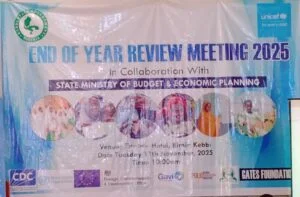UNICEF pushes for establishment of family court in Kebbi
UNICEF pushes for establishment of family court in Kebbi
The United Nations Children’s Fund (UNICEF) on Tuesday says it will support the establishment of family court in Kebbi to hasten justice at the grassroots.
Mr Michael Juma, Chief Field Officer, Sokoto Office, UNICEF, made the disclosure at the End of the Year Review Meeting 2025 held in Birnin Kebbi on Tuesday.
The News Agency of Nigeria (NAN) reports that the meeting was organised by UNICEF in collaboration with Kebbi Ministry of Budget and Economy Planning.
The chief field officer assured that he discussed with the Kebbi Commissioner for Justice on the necessary steps to follow to establish a Court that would be saddled with the responsibility of issues related with children.
“On the establishment of a family Court, of course, yes, I have talked to the Commissioner of Justice on this and I have said that it’s something the UNICEF will support.
“Because, this is what the UNICEF is supporting globally because it is a way to ensure quick justice at the rural levels,” he revealed.
Speaking on adequate data of children, Juma observed that correct information about children population would enable government and teachers to have correct figures for planning, especially on adequate budgeting for their needs.
The chief field officer commended the Kebbi House of Assembly for passing the Child Protection Bill, saying that such move would lead to the freedom of some children in detention.
He added that it would also lessen the rigorous trials being faced by children and assist them to be re-integrated into the larger society.
Juma lauded the state government for the release of N500 million counterpart fund on nutrition, while declaring the readiness of UNICEF to continue to collaborate with the state on poverty survey, social protection and nutrition intervention.
Commenting on the issue of out-of-school children and cholera outbreak, the chief field officer stressed the urgent need for all stakeholders to collaborate towards eradicating the menace.
He advocated a road map on WASH programme to ensure that other local government areas join Arewa and Mayama LGAs in the fight against open defecation across the state.
On his part, the Executive Chairman, State Universal Basic Education Board (SUBEB), Kebbi, Prof. Suleiman Khalid, cautioned various organisations at the meeting to be careful while implementing some policies that would be in conflict with the culture, religion and tradition of the people.
He stated that the menace of the out-of-school children and Almajiris was.mainly caused by social-cultural and religious factors.
Read Also: Nasarawa govt partners Silvex Int’l to market state-grown rice
The executive chairman decried how children and youths were migrating from villages to the urban centres in the name of seeking Islamic knowledge (Almajiri) or in search of livelihoods.
“We should ask ourselves, are they not having Islamic schools in their communities?
$Is there no traditional or religious leaders in their communities? I think we need to use the leaders to influence the parents to enroll their wards in schools.
“However, we have to be very careful on the enforcement of the law on the citizens. We need to adopt dialogues on how to implement these enforcement,” he advised.
VMT NEWS reports that nutrition, social policy, social and behavioral change, education, health, and WASH among others made presentation on their 2025 review.

